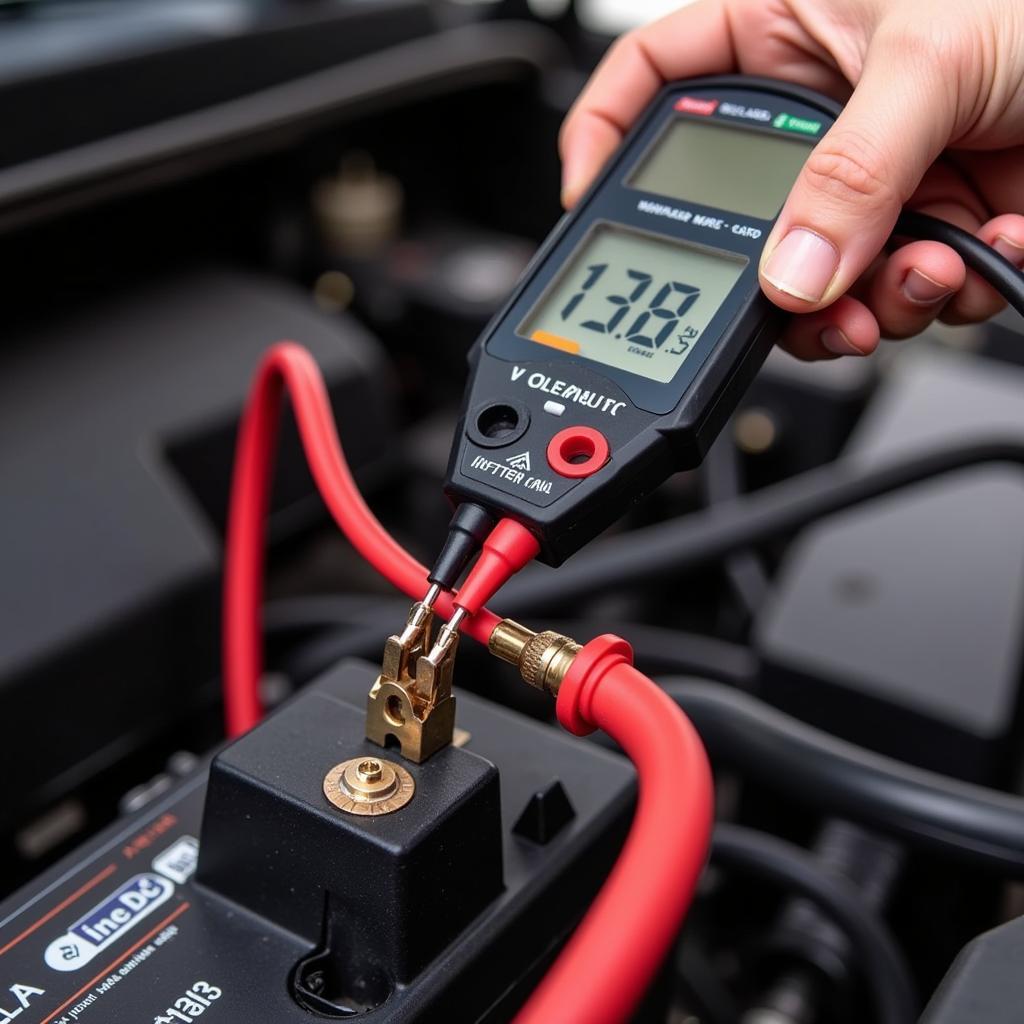A new car battery dying repeatedly can be incredibly frustrating. Within the first 50 words of this article, we’ll explore why a new battery in car keeps dying and offer effective troubleshooting steps and solutions to get you back on the road. This issue can stem from a variety of problems, from faulty alternator to parasitic draws and even simple things like leaving your lights on.
Why is My New Car Battery Dying?
Several factors can contribute to a new car battery failing prematurely. Identifying the root cause is essential for a permanent fix. Here are some of the most common culprits:
- Faulty Alternator: The alternator is responsible for recharging the battery while the engine is running. A malfunctioning alternator won’t charge the battery properly, leading to a dead battery.
- Parasitic Drain: Even when your car is off, certain electrical components continue to draw power. This is normal to a certain extent, but an excessive parasitic drain can deplete your battery overnight. Common culprits include faulty interior lights, glove box lights, or even aftermarket accessories.
- Corroded Battery Terminals: Corroded battery terminals can disrupt the flow of electricity between the battery and the car’s electrical system, eventually draining the battery.
- Extreme Temperatures: Both extreme heat and extreme cold can shorten the lifespan of a car battery, including a brand new one.
- Driving Habits: Short trips, especially in cold weather, don’t give the alternator enough time to fully recharge the battery. Repeated short trips can contribute to premature battery failure.
- Defective Battery: Although less common with a new battery, it’s possible you received a faulty unit.
How to Diagnose a Dying Car Battery
Here are some steps to help you diagnose the problem:
- Check the Alternator: Use a multimeter to check the voltage at the battery terminals while the engine is running. A healthy alternator should output between 13.5 and 14.5 volts.
- Test for Parasitic Drain: With the engine off and all accessories turned off, disconnect the negative battery cable. Connect a multimeter in series between the negative battery cable and the negative battery terminal. A reading of more than 50 milliamps suggests a parasitic drain.
- Inspect Battery Terminals: Check the battery terminals for corrosion. Clean them with a wire brush and baking soda solution if necessary.
- Review Your Driving Habits: Consider if you frequently take short trips or if your car is exposed to extreme temperatures.
Solutions for a New Car Battery Keeps Dying
Once you’ve identified the cause, here are some solutions:
- Replace the Alternator: If the alternator is faulty, it needs to be replaced.
- Identify and Eliminate Parasitic Drains: Systematically disconnect fuses one at a time to pinpoint the source of a parasitic drain. Once identified, repair or replace the faulty component.
- Clean Battery Terminals: Clean corroded battery terminals thoroughly.
- Modify Driving Habits: Try to combine short trips or let your car run for a longer period after starting to allow the alternator to recharge the battery.
- Warranty Replacement: If the battery is defective, contact the retailer or manufacturer for a warranty replacement.
Why Does a New Battery in Car Keep Dying After Replacement?
Even after replacing the battery, the issue may persist if the underlying problem isn’t addressed. A new battery can quickly be drained by the same issues as the old one.
“I’ve seen many cases where a customer replaces their battery, only to have the same problem reoccur within weeks,” says John Smith, Senior Automotive Technician at Smith Auto Repair. “This is often due to overlooking a faulty alternator or parasitic drain.”
How Can I Prevent My New Car Battery from Dying?
Regular maintenance can help prevent future battery problems:
- Regularly inspect and clean battery terminals.
- Limit short trips or allow sufficient time for recharging.
- Have your charging system checked periodically.
- Be mindful of aftermarket accessories and their power consumption.
“Preventive maintenance is key to prolonging the life of your car battery and avoiding unexpected breakdowns,” advises Maria Garcia, Lead Electrical Systems Engineer at Garcia Automotive Solutions.
Conclusion
A new battery in car keeps dying can indicate several underlying issues. By following these diagnostic and troubleshooting steps, you can identify the root cause and implement the appropriate solution, getting you back on the road and avoiding further frustration. Don’t hesitate to seek professional help if you’re uncomfortable working on your car’s electrical system.
 Testing Car Battery Voltage with Multimeter
Testing Car Battery Voltage with Multimeter
FAQ
- How long should a new car battery last? Typically, 3-5 years.
- Can leaving my lights on drain a new battery? Absolutely.
- Is it dangerous to work on my car’s electrical system? Yes, take precautions.
- How much does it cost to replace an alternator? Varies depending on the make and model of your car.
- Can I jump-start my car if the battery keeps dying? Yes, but it’s a temporary solution. You need to find and fix the root cause.
- What are some signs of a bad alternator? Dimming headlights, flickering interior lights, and strange noises from the engine bay are common signs.
- Should I disconnect my battery if I’m not driving my car for a long time? Yes, this can help prevent the battery from draining.
